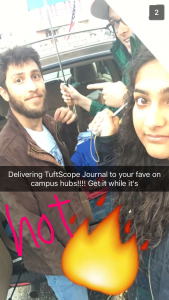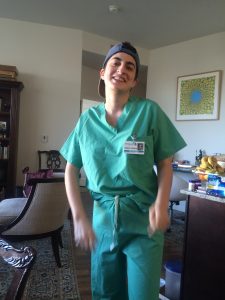Today, as a Junior at Tufts, I am a pre-medical sociology major with a cluster in social inequalities and social change. I am the Acquisitions Editor for TuftScope, Tufts’ double-blind, peer-reviewed journal of health, ethics and policy. Last semester, I spoke to an audience of a few hundred people about my experiences growing up as an American with Iranian heritage with Tufts’ Monologues.
——
My most prominent memory from the beginning of my sophomore year at Tufts was one in which I was obstinately nestled under my unwashed sheets, and assessing my ability to leave my bed at all. A few days prior, my mother had been diagnosed with breast cancer. Leaving my dorm room in Carmichael, being seen by my peers, and being held responsible for a full course load seemed completely unfeasible. In that moment, hiding under my sheets, I thought about what I thought a pre-health student looked like. I thought about Biochemistry majors who worked on TEMS and I thought about Community Health majors who worked as Biology tutors. A trembling infant with an undeclared major who refused to get out of their own bed didn’t really fit the template I’d created in my head.
The contrast between my current state and the images I was conjuring of the “ideal” pre-health student was pretty stark. I hadn’t worked in a lab, I did not think I worked well with other people, and I was considering dropping out of Chem 2 to take care of my mental health. There were plenty of days where I had to email my professors because I couldn’t get out of bed, and many of those days were spent with the shades drawn and under a blanket.
A few weeks into the semester, I sought to fill my time with an extracurricular activity to incentivize leaving my room. One day early in the semester, a friend texted me that the TuftScope GIM was in 5 minutes and that I should get dressed and run from my dorm to Eaton to see if I wanted to get involved. I went to the GIM, met the e-board, and agreed to write one article with them. It started with a book review for a book that I would have to read for Medical Sociology— The Spirit Catches You and You Fall Down. It was about a page and didn’t take me very long to write. Later that se mester, I applied for a role on the e-board posting for their Facebook page as a New Media editor. It wasn’t a very rigorous job at first, but I was doing something that I liked, and it was a start for me. It was a great way to meet more people at Tufts, and it appealed to my personal interests and strengths as a pre-medical student and as a prospective sociology major. In that sense, finding a group on campus as flexible as TuftScope was perfect for me— from writing short news briefs every few weeks, to submitting a longer article, to applying for an e-board position, I could fit TuftScope into any semester. I joined an organization of editors and writers with similar interests which didn’t demand my constant availability unless I wanted it to.
mester, I applied for a role on the e-board posting for their Facebook page as a New Media editor. It wasn’t a very rigorous job at first, but I was doing something that I liked, and it was a start for me. It was a great way to meet more people at Tufts, and it appealed to my personal interests and strengths as a pre-medical student and as a prospective sociology major. In that sense, finding a group on campus as flexible as TuftScope was perfect for me— from writing short news briefs every few weeks, to submitting a longer article, to applying for an e-board position, I could fit TuftScope into any semester. I joined an organization of editors and writers with similar interests which didn’t demand my constant availability unless I wanted it to.
But from there, it wasn’t all uphill. I remember getting my first Chem grade of the semester back and crying in between stacks of books in Tisch. I called my mom and asked if she would be mad if I needed to go home for the semester. She said she wouldn’t be. To this day, I regard my ultimate decision to stay at Tufts and take a W in Chemistry as just as reasonable as dropping out of the semester altogether would have been.
Having decided to stay at Tufts, I took it very, very slow. I submitted a piece I wrote to the Monologues, a year-long production prioritizing female identifying, gender-nonconforming, gender-queer, and trans* individuals, to potentially talk about my upbringing in America as it pertained to my heritage. I spent most of my time in those two sophomore semesters focusing on understanding and forgiving myself, and reading and writing about things I loved, independent of the academic work I did for Tufts. This felt humanizing to me. The summer following that academic year, I continued seeing my counselor with Tufts’ Counseling and Mental Health Services, and spent a few hours a week volunteering at a local hospital. Much of my time was working with high school students and taking walks with elderly folk. Admittedly, the majority of my summer was spent cooking and watching Netflix, because I wasn’t done taking it slow.
Now, I am done taking it slow. Cultivating the stability I have now as a Junior took time for me, and it was very hard. I don’t think that at any point over the past year, I ever looked like what I’d imagined a pre-health student to look like. I realized that the only thing pre-health students have in common is a potential desire to go into a health profession. This commonality won’t yield a homogeneous population of student— not remotely so. If you are pre-health and you are hiding under a blanket for the moment because you need to rest, you are still a pre-health student, same as any other student who is thinking of entering the health profession. And if you’re dedicating your young adult years to learning how to care of other people’s health, it makes a lot of sense to start with your own.
taking it slow. Cultivating the stability I have now as a Junior took time for me, and it was very hard. I don’t think that at any point over the past year, I ever looked like what I’d imagined a pre-health student to look like. I realized that the only thing pre-health students have in common is a potential desire to go into a health profession. This commonality won’t yield a homogeneous population of student— not remotely so. If you are pre-health and you are hiding under a blanket for the moment because you need to rest, you are still a pre-health student, same as any other student who is thinking of entering the health profession. And if you’re dedicating your young adult years to learning how to care of other people’s health, it makes a lot of sense to start with your own.
Leave a Reply